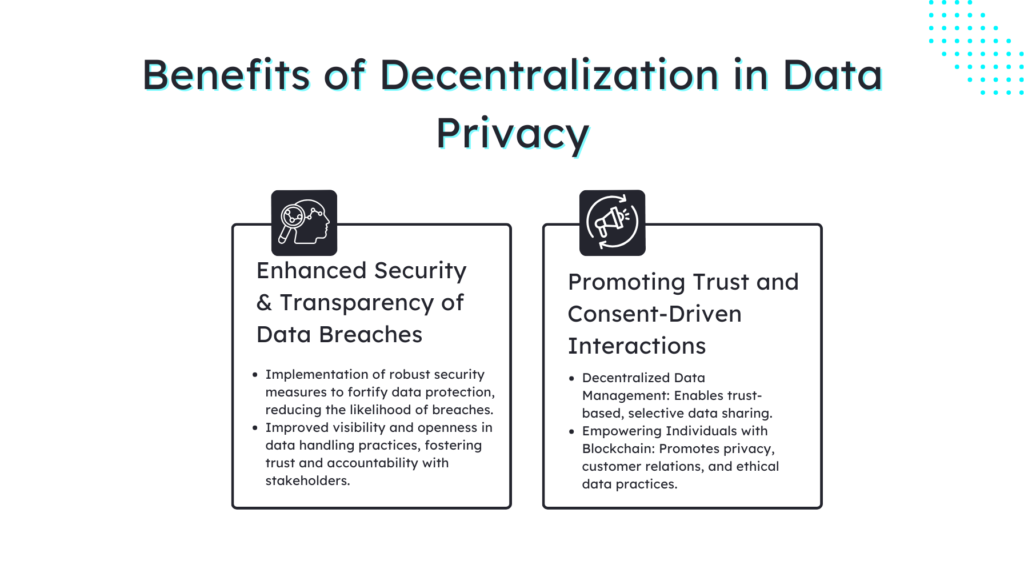
In an era where digital interactions have become the cornerstone of modern life, the protection of personal data is a critical concern. As individuals navigate the digital landscape, their every click, purchase, and online interaction leaves behind a trail of valuable information. However, the custodianship of this data has often been a contentious topic, leading to questions about who has access, how it’s used, and most importantly, how it’s protected.
Traditional data management practices, often centralized within companies and platforms, have raised alarm bells regarding data privacy. High-profile data breaches and unauthorized data sharing have cast a shadow over the digital realm, eroding trust between consumers and the entities that hold their data.
Blockchain technology is an innovation that is transforming the landscape of data privacy in marketing. By embracing the principles of decentralization, blockchain offers a novel approach to data management; one that empowers individuals with ownership and control over their own data. This shift towards decentralized data management will impact marketing strategies, customer trust, and the very foundation of digital interactions.
We’ll delve into the intricacies of data privacy concerns in marketing and the limitations of centralized data management. We explore the promises and possibilities of decentralized data management using blockchain technology, and how it can revolutionize the way businesses handle customer data. From enabling users to take charge of their personal information to reshaping marketing strategies through consent-driven and customer-centric approaches, we embark on a journey that illuminates how blockchain can reshape the digital landscape in favor of user privacy.
Understanding Data Privacy Concerns in Marketing
Our digital interactions have woven a complex tapestry of personal information—a tapestry of our preferences, behaviors, and interests. Every click, search, purchase, and interaction contributes to what we now recognize as our ‘digital footprint.’ This footprint is a collection of data that holds insights into who we are as individuals, creating the potential for brands and businesses to deliver more personalized experiences.
However, this very collection of data comes with inherent concerns. The digital footprint, once scattered across the internet, can be pieced together by tech-savvy entities. The amalgamation of seemingly unrelated interactions paints a detailed picture of our lives, and therein lies the dilemma. Our digital footprints can be easily tracked, recorded, and used without our explicit consent.
Understand how your prospects behave (in real time)
- Visualize how visitors move across your website
- Identify drop-offs and friction points instantly
- Turn journey data into actionable insights with AI

Highlighting the Potential Misuse of Customer Data
This collection of personal data, when centralized and held by third parties, presents a significant concern—the potential for misuse. As customers, we are entrusting our data to platforms and companies with the expectation that it will be handled responsibly and ethically. Unfortunately, this isn’t always the case. Instances of data breaches, unauthorized data sharing, and even the selling of personal information have been reported, resulting in a breach of trust that reverberates through the digital ecosystem.
The misuse of customer data has far-reaching consequences. It not only exposes individuals to privacy risks but also erodes the fundamental trust that underpins customer-brand relationships. When customers feel that their data is being exploited without their knowledge or consent, the consequences are twofold. They become hesitant to share their information and wary of engaging with brands that do not prioritize their privacy.
As data privacy breaches continue to make headlines, the call for a solution that places control back into the hands of individuals becomes ever more urgent. Blockchain technology promises to redefine the landscape of data management and privacy in the marketing domain. By granting individuals the power to own and control their data, blockchain offers hope in the battle to restore digital trust and ensure that the digital footprint remains under the control of its rightful owner.
The Promise of Decentralized Data Management
At its core, blockchain is a distributed and immutable ledger—a digital record that is shared across a network of participants. Each entry, or ‘block’, in the ledger is linked to the previous one, forming a secure chain of data. This architecture ensures that data alterations are nearly impossible without consensus from the entire network, thereby enhancing the integrity and security of the data.
The revolutionary aspect of blockchain lies in its ability to decentralize data ownership. Traditionally, centralized entities have held control over customer data, often leading to concerns about privacy breaches and misuse. Blockchain flips this model by giving individuals direct ownership and control over their personal information. Instead of data residing within a single repository, vulnerable to breaches, individuals store encrypted fragments of their data across the blockchain network. This fragmentation ensures that no single party holds complete access to the data, enhancing privacy and security.
Benefits of Decentralization in Data Privacy
Enhanced Security, Transparency, and Reduced Risks of Data Breaches
The decentralized nature of blockchain contributes to heightened data security. With no single point of entry, the potential attack vectors for hackers are significantly reduced. Additionally, the immutable nature of blockchain ensures that once data is recorded, it cannot be altered retroactively without consensus, making it nearly tamper-proof. This inherent security fosters trust between individuals and businesses, assuring customers that their data remains inviolable.
Promoting Trust and Consent-Driven Interactions
Decentralized data management aligns with the principles of trust and consent-driven interactions. Customers can grant selective access to specific data to businesses, ensuring that only the necessary information is shared for relevant transactions. This mechanism empowers individuals to control who accesses their data, which in turn fosters a higher level of trust in the digital realm. Consent-driven data sharing becomes a cornerstone allowing individuals to feel confident that their data is being used only for agreed-upon purposes.
The transition from centralized to decentralized data management introduces a shift in how personal information is treated. By granting users ownership and control over their data, blockchain empowers individuals with agency in the digital landscape. This opens up opportunities for businesses to adopt privacy-conscious practices, build deeper relationships with customers, and pave the way for a more secure and ethical approach to data management in marketing and beyond.

Reshaping Marketing Strategies with Decentralized Data Management
Crafting Personalized Marketing Campaigns Using Anonymized Data
Imagine a scenario where businesses can glean insights from anonymized, aggregated data directly from customers. Through blockchain’s secure and transparent framework, customers can willingly contribute data for analysis. This data, stripped of personally identifiable information, provides a goldmine of insights. Businesses can discern trends, preferences, and behaviors while upholding the sanctity of individual privacy. The result? Personalized marketing campaigns that resonate on a deeper level, without infringing on personal boundaries.
Consent-Driven Marketing
Decentralized data management introduces an essential principle—explicit customer consent. Individuals have the power to determine who accesses their data and for what purpose. This concept transforms data sharing into a dynamic and trust-building process. When customers explicitly grant access, it signifies a conscious choice, enhancing the ethical foundation of data-driven marketing.
Blockchain's Transparency Fostering Trust
Blockchain’s inherent transparency aligns perfectly with consent-driven marketing. Every data transaction is recorded on the blockchain, forming an immutable ledger that customers can access. This transparency ensures that individuals remain informed about how their data is being used. Brands are no longer shrouded in opacity; they operate within a framework of openness. As a result, the trust deficit that has plagued data sharing in the past is bridged, paving the way for stronger, more authentic customer relationships.
Overcoming Legal and Privacy Barriers in Cross-Border Marketing
In a globalized world, cross-border marketing is a powerful tool. However, navigating legal and privacy regulations can be a labyrinth. Decentralized data management acts as a guide for compliant cross-border endeavors. By empowering customers with data ownership, businesses can adhere to regulations while still accessing relevant insights.
Imagine a scenario where a customer in one country can share encrypted data with a business in another, all while adhering to the unique privacy laws of both jurisdictions. Blockchain’s secure and encrypted nature makes this scenario a reality. Data can be shared without exposing sensitive information, offering a seamless cross-border experience that respects both privacy and regulations.
As businesses embrace decentralized data management, marketing strategies undergo a transformative shift. From crafting personalized campaigns with integrity to fostering trust through explicit consent to transcending borders with compliance; blockchain-driven data management ushers in a new era of marketing. An era defined by customer empowerment, ethical practices, and the potential for seamless global engagement.
Real-World Implementations and Case Studies
Healthcare Industry: Protecting Sensitive Data
In the realm of sensitive data management, few industries rival the complexity of healthcare. Patient records, treatment histories, and medical information are all part of a highly confidential domain that demands the utmost security. Blockchain’s decentralized architecture lends itself perfectly to safeguarding sensitive patient data while allowing for secure data sharing with explicit consent.
Imagine a patient with a complex medical history seeking a second opinion. Traditionally, sharing comprehensive medical records with another healthcare provider involves a complicated process of permissions, paperwork, and potential security vulnerabilities. Blockchain technology streamlines this process. Patients can own their medical records as encrypted digital assets stored on a blockchain. When seeking a second opinion, patients grant access to their records via a secure blockchain transaction, ensuring that only authorized parties can view the data. This empowers patients to manage their health data and foster trust in a system that prioritizes privacy and transparency.
E-Commerce: Personalization without Intrusion
E-commerce thrives on personalization, but the line between relevant recommendations and invasive intrusion is thin. Blockchain offers an elegant solution—one that harmonizes personalization with privacy. E-commerce platforms are embracing blockchain to tailor recommendations based on user-controlled data, ensuring that personal preferences are honored without encroaching on individual boundaries.
Consider an e-commerce platform that uses blockchain to enable users to curate their preferences and interests as encrypted data on the blockchain. This data is under the user’s complete control, allowing them to adjust and modify it as desired. As users engage with the platform, blockchain dynamically updates their preferences and suggests products or services without ever accessing personally identifiable information. This blend of personalization and privacy respects user autonomy while delivering a seamless and customized shopping experience.
By examining these real-world implementations, we witness the tangible impact of decentralized data management through blockchain technology. From safeguarding sensitive medical information to redefining personalized e-commerce experiences, blockchain is proving its transformative potential in reshaping data privacy, building trust, and fostering innovative practices across diverse industries.
Future Perspectives and Challenges
The trajectory of data management is a shift that sees decentralized data management becoming the new norm in marketing practices. As blockchain technology gains traction and businesses witness its transformative impact on data privacy and customer trust, the adoption of decentralized data management is likely to accelerate. What once seemed radical is steadily gaining acceptance as the next logical step in digital evolution. The era of individuals taking ownership of their data is dawning, promising a future where privacy and personalization coexist harmoniously.
The ramifications of this transition extend beyond the realm of marketing. Empowering individuals with control over their data reverberates throughout society, impacting how we interact with technology and each other. As users regain sovereignty over their digital identities, a sense of agency is restored. This newfound empowerment has the potential to reshape the digital landscape, fostering a culture where transparency, trust, and ethical data practices prevail. Ultimately, the societal impact could extend beyond business realms, triggering a broader shift in how data is perceived and managed across various sectors.
Addressing Potential Challenges in Adopting Decentralized Data Management
While the promises of decentralized data management are enticing, the path to adoption is not without challenges. Transitioning from established centralized models to decentralized models requires a change in mindset, processes, and infrastructures. Technological barriers, interoperability issues, and the need for standardization can pose obstacles to the seamless integration of blockchain-powered data management.
To address these challenges, collaboration between businesses, consumers, and technology experts is imperative. Businesses need to navigate uncharted waters by investing in education and training to comprehend the nuances of blockchain. Consumers, on the other hand, should be informed about their rights and responsibilities in a decentralized data ecosystem. Moreover, technological advancements that enhance blockchain scalability, interoperability, and user-friendliness will play a pivotal role in streamlining adoption.
By acknowledging these challenges and embracing a collaborative approach, businesses can pave the way for a smoother transition to decentralized data management. As consumers become active participants in their data journey and businesses become custodians of trust, the collective effort can usher in an era where data privacy is a fundamental right, personalization is a respectful privilege, and the digital landscape is marked by mutual respect and empowerment.
Increase +180% conversions from your website with AI
Get more conversions from your existing traffic by delivering personalized experiences in real time.
- Adapt your website to each visitor’s intent automatically
- Increase conversions without redesigns or dev work
- Turn anonymous traffic into revenue at scale

Conclusion
The journey from centralized data management to decentralized ownership is not just a technological shift; it’s a transformation in the very fabric of how we perceive, share, and safeguard our digital identities.
As we’ve explored the intricacies of decentralized data management through blockchain, we’ve highlighted the potential for individuals to reclaim control over their data; fostering trust and reshaping the landscape of marketing and beyond. This shift is not just about data security; it’s about restoring the balance between technology and human agency, recognizing that every data point represents a choice and a voice.
The trajectory ahead envisions a world where data isn’t merely a commodity, but a reflection of individual autonomy. Decentralized data management has the power to redefine how businesses engage with customers, making personalization ethical and consent-driven. It speaks to a future where privacy and personalization exist seamlessly, where individuals navigate digital realms with newfound confidence, and where data sharing is rooted in transparency and choice.
As we partake in this transition, one thing is certain: the era of passive data subjects is yielding to the age of empowered data owners. The future of data privacy is not simply about safeguarding against breaches; it’s about embracing a narrative where individuals control their data story. It’s about reimagining the digital landscape as a place where trust thrives, where data is respected, and where innovation serves the higher purpose of humanity.

